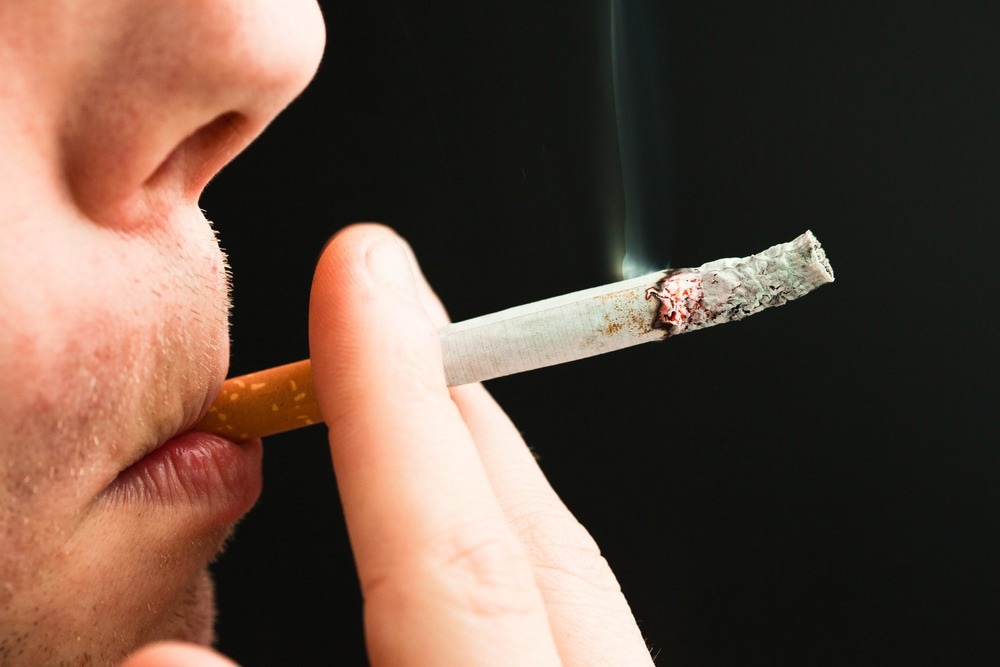Smoking and the risk of contracting SARS-CoV-2 and COVID-19

Smoking increases the risk of respiratory infections, such as colds, flu, pneumonia, and tuberculosis. Smoking may also contribute to coronavirus disease 2019 (COVID-19) complications.

Study: Tobacco product use and the risks of SARS-CoV-2 infection and COVID-19: current understanding and recommendations for future research. Image Credit: wavebreakmedia / Shutterstock.com
Background
Numerous previous studies have confirmed the deleterious impact smoking has on the lungs. The harmful chemicals in tobacco smoke affect both the epithelium and vascular endothelium of the lungs.
More specifically, these substances appear to directly damage the epithelial cells, which subsequently impacts the epithelial barrier and mucociliary clearance. In addition to these direct effects, these damaged cells release modified molecules into the lungs, which stimulate specific receptors that ultimately activate innate and acquired immune responses.
Despite the growing interest in determining the relationship between smoking and COVID-19, the overwhelming caseload of COVID-19 patients has limited the ability of researchers to dedicate time to this investigation. Nevertheless, a recent The Lancet Respiratory Medicine study examines the potential effects of tobacco use on severe acute respiratory virus coronavirus 2 (SARS-CoV-2) transmission, the pathophysiological changes due to tobacco use, as well as the effects of tobacco on immune and inflammatory responses to COVID-19.
About the study
The objective of the current study was to determine whether tobacco users have a greater preponderance of developing symptomatic SARS-CoV-2 infection, as well as whether this patient population is at a higher risk of severe COVID-19 or associated mortality, long COVID, or a different vaccination response.
The researchers analyzed the behavioral mechanisms associated with tobacco consumption on COVID-19 and inflammatory immune responses. Furthermore, they also screened risk factors for the development of public health policies and patient care delivery.
To identify articles on COVID-19 and tobacco use, the researchers searched PubMed and Embase databases. Web of Science, PsycINFO, CINAHL, and Sociological Abstracts were also searched, while duplicates and opinion pieces were removed.
PubMed, Web of Science, Embase, CINAHL, PsychINFO, and Sociological Abstracts were searched again for articles on COVID-19 and tobacco use that were published between December 9, 2020, and August 30, 2021. Taken together, a total of 2,151 articles were selected for review.
Study findings
Epidemiological studies investigating the impact of cigarette smoking on SARS-CoV-2 infection have rendered mixed results. Thus, further research is needed to ascertain whether smoking or the use of other tobacco products contributes to the susceptibility to COVID-19.
It appears that smokers are more likely to suffer adverse outcomes associated with COVID-19, including hospitalization and progression to severe disease. Tobacco use is associated with COVID-19 severity; however, further studies are needed to elucidate whether nicotine and non-nicotine tobacco product ingredients contribute to disease susceptibility.
Upregulation of angiotensin-converting enzyme 2 (ACE2) receptors, immune suppression, oxidative stress, inflammation, and vascular injury may underlie the relationship between cigarette smoking and severe COVID-19. Cigarette smoking increases the risk for long-term lung disease, cardiovascular disease, and diabetes, all of which increase the risk of severe COVID-19.
Tobacco products contain a wide range of potentially toxic chemicals, while several harmful chemicals are also formed during the aerosolization process due to the heating or combustion of the product. The use of tobacco products can result in substantial damage; however, it remains unclear how individual chemicals and constituents contribute to these pathophysiological effects.
In addition to the impaired mucociliary clearance in the lungs, increased lung permeability, impaired immune function, higher expression of ACE2, cardiovascular dysfunction, as well as viral infections, and severe diseases may be more common among smokers.
Through its activation of the cholinergic response, nicotine exerts an anti-inflammatory effect in several pathological conditions. However, its role within the context of the complex milieu of these conditions is not well understood. Further, sharing of tobacco products increases SARS-CoV-2 transmission risk, as does passive smoking and inhalation of e-cigarette aerosols.
Conclusions
Smokers are more vulnerable to sustaining poor COVID-19 outcomes as compared to non-smokers. To better shape public health recommendations and improve the care of individuals with a history of tobacco dependence, a more thorough understanding of tobacco use and disease risk is needed.
It will be imperative for future studies to obtain sufficient information about tobacco product use. Furthermore, the development of a validated and harmonized approach to assessing the effect of tobacco use on COVID-19 susceptibility and disease severity, as well as the risk of other infectious diseases, will also be crucial.
- Benowitz, N., Goniewicz, M., Halpern-Felsher, B., et al. (2022). Tobacco product use and the risks of SARS-CoV-2 infection and COVID-19: current understanding and recommendations for future research. The Lancet Respiratory Medicine. doi:10.1016/s2213-2600(22)00182-5
Posted in: Men's Health News | Medical Science News | Medical Research News | Women's Health News | Disease/Infection News
Tags: ACE2, Angiotensin, Angiotensin-Converting Enzyme 2, Anti-Inflammatory, Cardiovascular Disease, Chemicals, Cigarette, Coronavirus, Coronavirus Disease COVID-19, Diabetes, Enzyme, Flu, Infectious Diseases, Inflammation, Lung Disease, Lungs, Medicine, Mortality, Nicotine, Oxidative Stress, Passive Smoking, Pneumonia, Public Health, Research, Respiratory, Respiratory Virus, SARS, SARS-CoV-2, Severe Acute Respiratory, Smoking, Stress, Tobacco, Tuberculosis, Vascular, Virus

Written by
Nidhi Saha
I am a medical content writer and editor. My interests lie in public health awareness and medical communication. I have worked as a clinical dentist and as a consultant research writer in an Indian medical publishing house. It is my constant endeavor is to update knowledge on newer treatment modalities relating to various medical fields. I have also aided in proofreading and publication of manuscripts in accredited medical journals. I like to sketch, read and listen to music in my leisure time.
Source: Read Full Article




